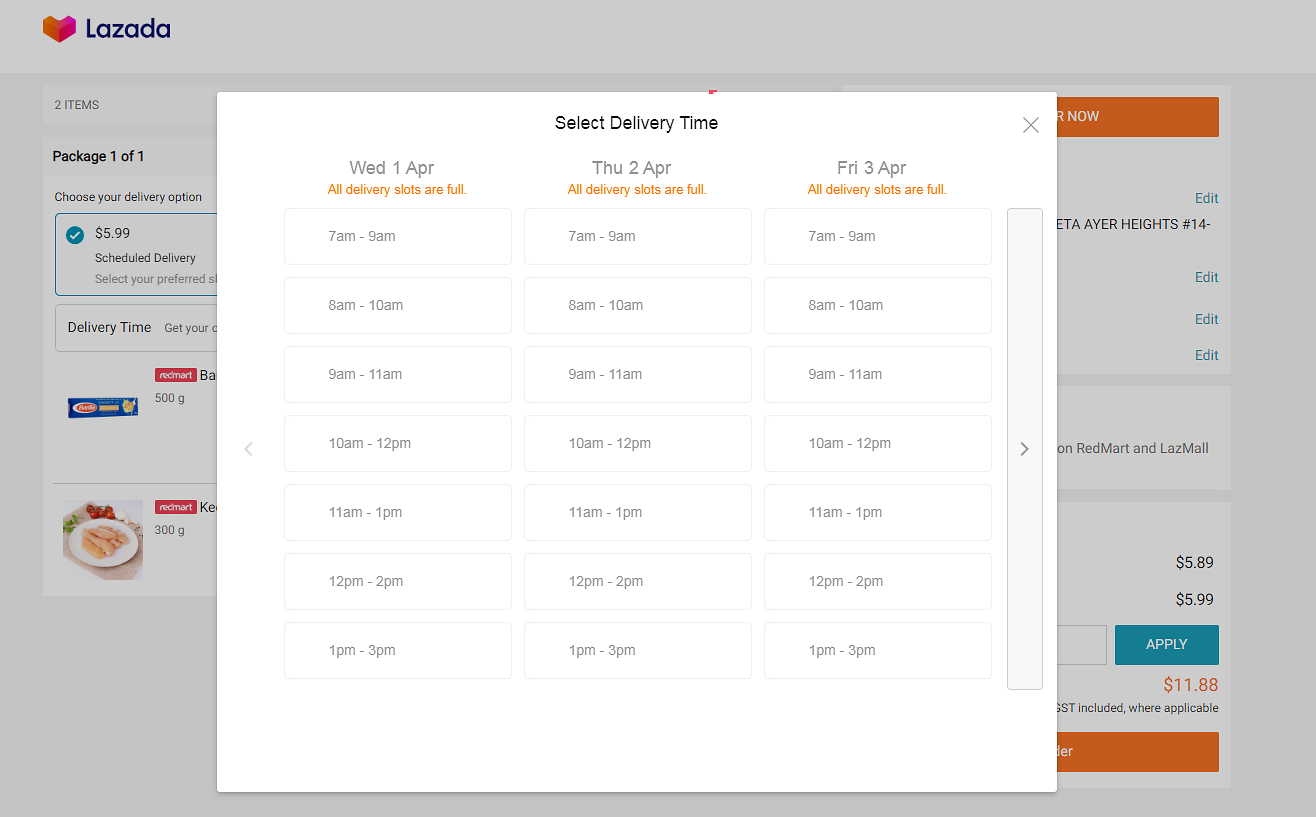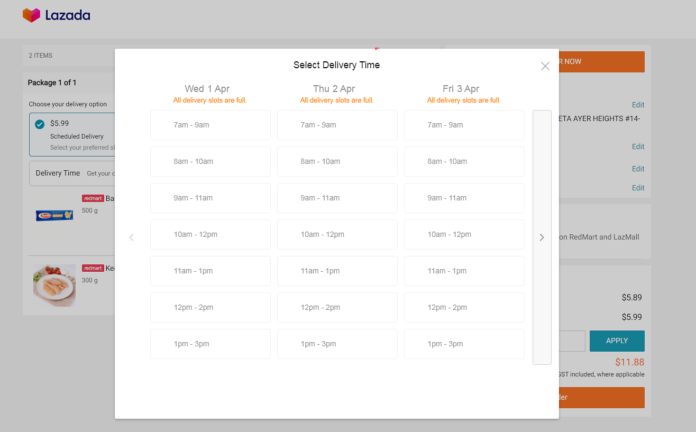SINGAPORE: As consumers turn to online shopping following the COVID-19 outbreak, many are finding it difficult to secure the delivery of groceries and other daily essentials through online supermarket platforms.
One shopper, Ms Tasha Abdul Mutalib, said that for more than a week, she has been unable to get a time slot to have her groceries delivered, despite checking platforms such as RedMart and FairPrice Online multiple times a day.
“I have not been successful since last week, despite stock apparently moving and slots being taken up, no idea when they are made available or when new slots are put up,” said the 31-year-old, who is currently unemployed.
Another shopper, who wanted to be known only as Mrs Chee, said she usually orders her groceries online fortnightly on Thursdays, with her items being delivered two to four days later.
However, when Singapore raised its Disease Outbreak Response System Condition (DORSCON) level to Orange in early February, it took about one-and-a-half weeks before she was only able to secure delivery slots.
“It took about two to three weeks before the delivery slots became normal,” the 39-year-old recalled.
“Since the announcement on Mar 24 of enhanced distancing measures, the delivery slots from RedMart and FairPrice have been cut off completely.”
Checks by CNA on RedMart and FairPrice’s online platform on Tuesday morning (Mar 31) found no available delivery slots. It was a similar situation over the past week, at various times of the day.

A screenshot of the RedMart website on Mar 31, 2020 shows full delivery slots for Apr 1 to Apr 3.
Screenshot of the FairPrice On website with no delivery slots available.
Users of other delivery services said they are also facing problems securing their orders.
Ms Nadiah Said said her attempts to buy items such as fresh produce, toiletries and detergent through Amazon Prime were unsuccessful.
“My husband went to the supermarket to get some of the things we needed. My mum also helped to get us some things which were unavailable in the supermarket from the wet market,” said the 37-year-old stay-at-home mother of four.
Some expressed frustration at the situation, especially since the Government on Saturday advised against “non-essential” trips to shopping malls, and to opt to buy food and groceries online as part of safe distancing measures to limit the spread of the coronavirus.
READ: COVID-19: Singaporeans urged to defer non-essential trips to malls
READ: Jail terms, fines for those who breach COVID-19 safe-distancing rules, stay-home notice
“Buying online has always been easy, but I’ve noticed that those who take advisories seriously still have to compete with panic buyers for the cheaper brands of essentials like bread, rice and eggs because these orders are fulfilled off the shelf instead of set aside,” said Ms Tasha.
“I have not hoarded supplies, but have chosen to buy what I need,” said Mrs Chee. “When it’s time for my next groceries stock up, will there still be online delivery?”
Online platforms have said they are trying to increase their capabilities to meet increasing demand during this time.
“Due to increase in demand, delivery times may be longer than usual. We are working around the clock to ensure availability of products, and continuing to bring on additional capacity to deliver customer orders,” said an Amazon spokesperson.
A spokesperson for Lazada, which owns RedMart, said the company is working hard to increase its capacity to fulfill orders, adding that it is looking for companies which can support its efforts during this time.
“As precautionary measures, we have implemented purchase limits on specific product categories and are making changes to our assortment to ensure that there are enough daily essentials for our customers,” she added.
Foodpanda, which delivers both food and groceries, noted that it has a proprietary dispatch algorithm which it uses to meet surges in demand, adding that it is “constantly” looking to add to its fleet of 8,000 riders.
CNA has also contacted FairPrice and Dairy Farm Group, the parent company of supermarket chains Cold Storage and Giant, for comment.
TAXI, PRIVATE-HIRE DRIVERS TO BE ALLOWED TO MAKE DELIVERIES
On Sunday, Minister for Transport Khaw Boon Wan announced that taxi and private-hire car drivers would be allowed to make grocery and food deliveries, noting the higher demand due to “tighter safe distancing measures, working from home and telecommuting” amid the COVID-19 crisis.
While there were previously concerns about allowing such services due to the impact on passenger service and traffic congestion, Mr Khaw noted that this is “an unusual time” with less demand for point-to-point transport services.
Some taxi and private-hire car drivers have reported that their incomes have dropped by more than 30 per cent following reduced demand due to the coronavirus outbreak.
File picture of taxis in Singapore. (Photo: TODAY)
In response to queries from CNA, the Land Transport Authority (LTA) said it is working out the details of the scheme with interested operators.
“Drivers who are interested to participate in the trial can find out more details from their respective companies,” said an LTA spokesperson. “The operators can work with the various companies to explore suitable collaborations as it is commercial in nature.”
“In difficult times like these, any additional job which our cabbies can take is welcome,” said Ms Tammy Tan, group chief corporate communications officer for taxi operator ComfortDelGro.
Gojek Singapore general manager Lien Choong Luen said: “We are exploring what the best approach to this might look like, which could include a partnership model. We will continue to work with the Singapore government to find new ways to support our driver-partners during this period.”
Grab – which since last September has been conducting a trial with LTA to allow its drivers to provide on-demand parcel and food delivery services – said “thousands” of its drivers, making up 15 per cent of its total pool, would now be able to make deliveries.
READ: COVID-19: Taxi, private-hire car drivers allowed to make home deliveries to meet increased demand
READ: Taxi drivers affected by reduced demand could be temporarily redeployed as ‘transport ambassadors’: Khaw Boon Wan
National Trades Union Congress assistant director-general Ang Hin Kee – who is advisor to both the taxi and private-hire vehicle associations – hopes this would establish “new norms” that would allow such drivers, who are considered to be self-employed, to tap multiple streams of revenue to supplement their income in the future.
Consumers, meanwhile, are optimistic that roping in private-hire and taxi drivers to do deliveries will help reduce waiting times.
“Hopefully! That would be really helpful,” said Ms Nadiah.





